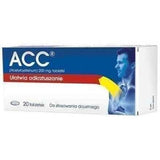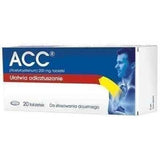ACC 200mg x 20 tablets, acetylcysteine
The acetylcysteine contained in ACC 200mg in two ways supports the fight against bronchitis: it not only liquefies the secretion, but also facilitates its expectoration, reducing its viscosity. A medicine in the form of tablets that can be swallowed or dissolved in water.
ACC 200mg acetylcysteine Composition:
One tablet contains: acetylcysteine - 200mg and excipients: lactose monohydrate - 34.4mg, microcrystalline cellulose, corn starch, citric acid, sodium cyclamate, sodium saccharin, magnesium stearate, lemon flavor.
ACC 200mg acetylcysteine Action:
ACC 200mg contains acetylcysteine, which is a derivative of one of the amino acids (cysteine). This substance has the effect of liquefying secretions (secretolytic) and facilitating expectoration of secretions from the respiratory tract (secretomotor). This is possible due to the reaction with disulfide bridges in mucopolysaccharide chains, causing depolymerization of DNA chains, which translates into a decrease in mucus viscosity. In addition, acetylcysteine is involved in the binding and detoxification of free radicals, and also contributes to increasing glutathione production.
ACC 200mg Application:
The ACC 200mg medicinal product intended to be used to facilitate expectoration by thinning the secretions of the respiratory tract, particularly helpful in the treatment of bronchitis.
Additional information: The product should be kept out of reach of children at room temperature.
Contraindications:
Do not use in case of hypersensitivity to any component of the drug and in patients with active peptic ulcer disease, acute asthmatic condition, as well as in children under 6 years of age.
Side effects:
Like other medicines, ACC 200mg can cause side effects: on the immune system: uncommon - hypersensitivity reactions, very rarely - anaphylactic shock, anaphylactic and anaphylactoid reactions; on the part of the nervous system: uncommon - headache; ear and labyrinth disorders: uncommon - tinnitus; cardiac disorders: uncommon - tachycardia; vascular: uncommon - hypotension, very rarely - hemorrhage; on the part of the respiratory system: rarely - shortness of breath, bronchospasm, on the part of the digestive system: uncommon - nausea, vomiting, diarrhea, abdominal pain, rarely - indigestion; skin and subcutaneous tissue disorders: uncommon - urticaria, rash, angioedema, pruritus, eczema; general disorders and conditions at the application site:
Dosage:
Use according to the physician's leaflet or instructions. Adults and children over 14 years of age: 1 tablet 2-3 times a day. The maximum dose of acetylcysteine is 400-600mg per day. Children aged 6-14 years: 1 tablet twice a day. The maximum dose of acetylcysteine is 400mg. Dissolve the tablet in 1/2 cup of water, eat immediately after preparation or swallow without chewing and drink with water. Take after a meal. Do not take at night and before bedtime. The drug should be used for no more than 4-5 days without consulting a doctor. If after this time the symptoms do not improve or get worse, it is necessary to consult a doctor.




